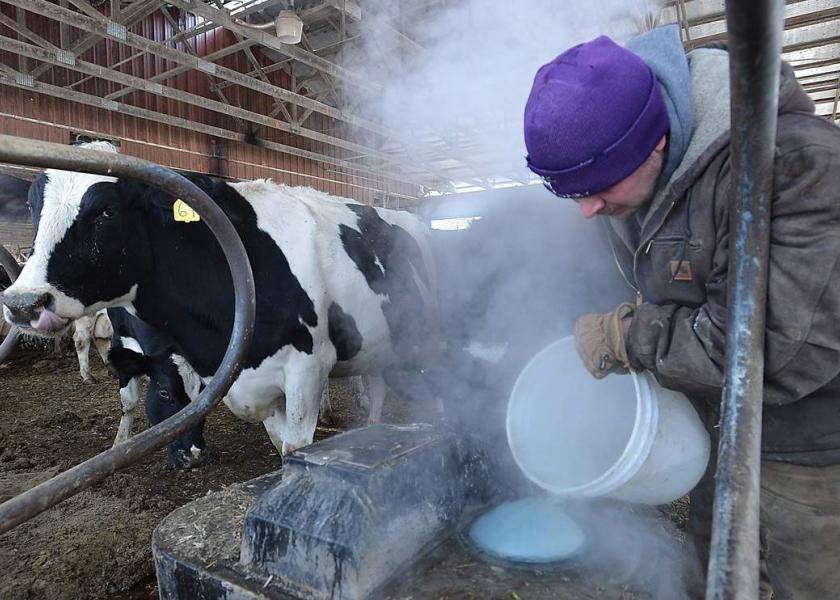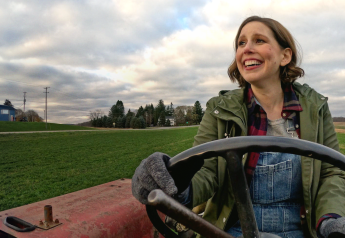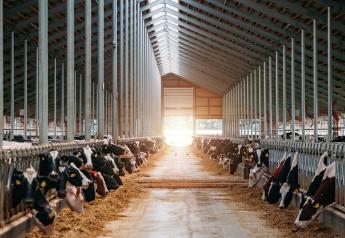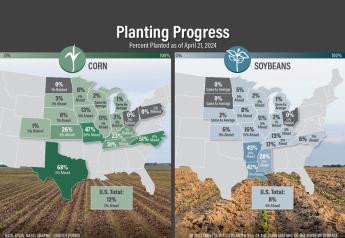Dairy Farmers Face Challenges in Bitter Cold Weather

Steven Woods and his employees milk cows every 12 hours at his dairy farm — at 3 a.m. and 3 p.m.
But what is typically a four-hour feeding, mechanical milking and cleaning process for 107 Holsteins and three Jersey cows takes longer in what's been a stretch of below-zero temperatures and wind chills.
The chores could take 30 minutes to two hours longer, depending on the problems, Woods said.
On Monday afternoon, the temperature read zero, with a wind chill that made it feel like minus 15. But that was nothing compared with Friday, when the temperature plunged to minus 28 at 4 a.m.
"Just to be brutally honest, it's terrible," said Woods, 27, who employs one full-time worker and three part-time employees on his 320-acre farm. He farms another 130 acres that he doesn't own.
The farm is off Water Street Extension in Washington Township, near Edinboro University of Pennsylvania.
"No matter what the weather is, the same stuff has to happen," said Woods, who holds a bachelor's degree in agricultural systems management from Pennsylvania State University.
And that's complicated by the obstacles that the weather throws at Woods and other dairy farmers.
On the frigid Monday, Woods pounded away at ice to open the gates in the free-stall barn where the cows spend most of the day, and poured hot water onto valves to thaw the line so water could flow to the plastic drinking containers in the barn.
He also cleaned out frozen manure from the concrete floor in the barn — normally a twice-daily process that Woods sometimes can only get to once a day in this weather.
"It's a lot more difficult to do because the manure freezes," he said.
In warmer weather, Woods attaches a rubber scraper to a skid loader to push the manure into a pit. But in colder weather, he uses a rectangular steel bucket on the front of the skid loader.
"We need something a little more sturdy to bust that manure off the (floor)," he said.
On Friday, Woods said the cold caused diesel fuel to gel in his skid loader, and the line in a tank that holds diesel fuel snapped in half when he tried to fuel a tractor.
"You see more breakdowns with cold equipment, and the cows are more stressed out when it's this cold," he said.
And the cattle, Woods said, are the priority. Woods also owns 20 other cows scheduled to have calves in the next eight weeks, and 80 heifers.
"In order to be a successful dairy farmer, you have to understand that the cows always come first. Fortunately, my employees understand that," said Woods during a respite in his new heated garage, or workshop.
Bitter cold affects production
On average, each cow at Woods' farm produces 75 pounds of milk per day. But on bitterly cold or extremely hot days, he can notice a drop in production. He checked the load sheet at the farm's milk house — which houses milking equipment and a bulk holding tank -- and it showed production of about 70 pounds on Friday, when temperatures plummeted to minus 28.
Farmers sell their milk in 100-pound units — not by the gallon — and the current price is taking a hit after what Woods said had been a record-breaking sales year in 2014.
In a fluctuating market, Woods said he gets about $14 to $16 per hundred pounds, compared with as much as $25 per hundred pounds in spring 2014.
"In December, we were still getting $24 per hundred pounds," he said.
Ginger Fenton, dairy educator with Penn State Cooperative Extension District 1 covering Erie, Crawford and Mercer counties, said the price reduction is due to a decline in exports and a drop in U.S. milk consumption while milk inventories hold steady.
China and some other countries don't have as much demand now, which is influencing the markets, she said.
The Wall Street Journal reported that demand from China has decreased as it has stockpiled supplies of nonfat, dry-milk powder. And Russia's import ban on dairy products and other food has weakened global demand, the Journal reported.
From farm boy to farm owner
Woods has been working on the farm since about age 4, when he started feeding calves when his grandfather, Vere Woods, now 90, owned it. He started driving tractors on the farm at age 8.
He continued to work there when his father, Daniel Woods, took over the operation.
Steven Woods went to Penn State, but while at State College, his father was diagnosed with non-Hodgkin lymphoma.
During his senior year, he came home every weekend to work because his dad was sick. Steven Woods graduated in May 2010, and his father was there for the ceremony.
But his father died in December 2010 at age 50.
"I had always planned on coming back and farming. The deal was that I would be allowed to farm if I got my degree," Steven Woods said.
Steven Woods, who is single, and his father had planned to tackle farming together. "Of course, that all kind of fell apart," he said.
Now Steven Woods is responsible for the operation, but he credits "great employees" for their work. Those employees are Nate Tallman, 21, of Edinboro, who works full time, and part-time employees Andi Marie Risjan, 43, her son, Jeremiah Risjan, 15, both of Cambridge Springs, and Mikayla Miller, 19, of Edinboro.
Steven Woods said he couldn't get through the day — cold weather or not — without them.
In the milking parlor Monday, Miller directed cows to each of the eight milking stations and rotated them out for the next grouping.
When her toes get cold during extreme conditions, Miller, wearing her rubber boots, said she steps into a hot bucket of water in the milk house.
Even with a wind chill of minus 15, it wasn't cold enough for that remedy on this day. The cold is bearable "as long as you can dress for it," she said.
Miller added, "In the morning, it's even colder."
And the cows must be milked on that schedule, Steven Woods said, or infections can set in, the cows become uncomfortable and production will drop.
"Whatever makes them happy, you have to get done," he said.







